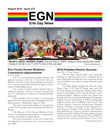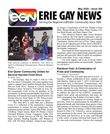New GenForward Survey: Millennials Views on LGBT Issues: Race, Identity and Experience cracks it open
Do more Millennials self-identify as LGBTQ than in past generations… or are they just more open about it? Are they more connected to their ethnic/racial group or to LGBTQ communities? What are their priorities? Millennials are America's largest, most diverse generation and potential voting bloc. What are they thinking?
For the first time, a new survey, GenForward: Millennials Views on LGBT Issues: Race, Identity and Experience asks these questions, and more, across Race, Ethnicity and Sexual Orientation.
GenForward is a nationally representative survey of Millennials led by Dr. Cathy Cohen from the University of Chicago, with oversamples of African American, Latinx and Asian American Millennials ages 18-34. This survey, taken from May 17 to June 3, 2018, includes interviews with 525 African American, 256 Asian American, 502 Latinx, and 553 white Millennials. It includes analysis of Millennials own sexual identities, their perceptions of discrimination against LGBT people both within the U.S. and their respective racial and ethnic communities, and their moral evaluations of LGBT relationships.
GenForward findings reveal new information and depart sharply from conventional assumptions. What jumps out right away?
- LGBTQ Millennials prioritize policies to end bullying of youth and to curtail violent hate crimes over policies that deal with family issues and health (HIV/AIDS) concerns, which were formerly front and center.
- The percentage self-identifying as L/G/B/T/ Q is at 14% -several points above the previously assumed 10% and way above the estimated 3% as a voting bloc. Is this generation more flexible about sexuality or just more open about orientation?
- Experiences of discrimination abound, with highest rates in communities of color.
- African American and Latinx Millennials see issues LGBT people face in communi-ties of color as quite different than what mainstream LGBT organizations focus on.
- And, while conventional wisdom tells us Millennials are open- minded, they express conflicted views over whether societal acceptance of homosexuality is degrading the country's moral fiber!
For more see the June 2018 fact sheet / for charts and graphics see attached fact sheet and reports:
GENFORWARD: MILLENNIALS VIEWS ON LGBT ISSUES: RACE, IDENTITY, AND EXPERIENCE
- GenForward is the first-ever political, social, and economic bimonthly survey of ethnically diverse Millennials. It highlights how race and ethnicity help shape the opinions of the country's most diverse generation.
- GenForward is a nationally representative survey of Millennials led by Dr. Cathy Cohen from the University of Chicago fielded by NORC with oversamples of African American, Latinx and Asian American Millennials ages 18-34. This survey, taken from May 17 to June 3, 2018, includes interviews with 525 African American, 256 Asian American, 502 Latinx, and 553 white Millennials.
- It includes analysis of Millennials own sexual identities; their connection or "linked fate" to LGBT people more generally, their perceptions of discrimination against LGBT people both within the U.S. and within their respective racial and ethnic communities, and their moral evaluations of LGBT relationships. Key findings include:
Identity and Connection
- Identifying as LGBTQ. Approximately 14% of Millennials identify as something other than straight/heterosexual. Larger percentages of Latinx Millennials (22%) identify as LGBTQ compared with African Americans (14%), whites (13%), and Asian Americans (9%).
- Group Solidarity. Millennials who identify as LGBT, independent of race and ethnic group, express higher levels of group solidarity, or "linked fate," with other LGBT people compared to the linked fate Millennials who identify as straight/heterosexual feel toward other straight/heterosexual young adults.
- Knowing Someone Who is LGBT. Large majorities of Millennials across race/ethnicity know someone who is gay or lesbian. Fewer, though still substantial, know someone who is transgender. White Millennials are the most likely to know a transgender person (36%) compared to other racial/ethnic groups (~22%).
Discrimination
Anti-LGBT Discrimination in the U.S. Large majorities of Millennials across race/ethnic-city believes there is "a lot" of or "some" discrimination against lesbians, gays, and transgender people in the United States.
- Millennials are more likely to say there is "a lot" of discrimination against transgender people compared to lesbians and gays (46% vs. 34%).
- Anti-LG Discrimination in Racial Communities. Majorities of Latinxs (61%) and Asian Americans (53%) say there is "a lot" of discrimination against lesbians and gays in their racial community, compared to 43% of African Americans and 27% of whites.
- Anti-Transgender Discrimination in Racial Communities. Majorities of Asian Americans (64%) and African Americans (58%) and pluralities of Latinxs (49%) and whites (47%) say there is "a lot" of discrimination against transgender people in their racial community.
- Racial Tensions in the LGBT Movement. Majorities of African American (53%) and Latinx (50%) Millennials believe that the issues confronting LGBT individuals in communities of color are very different than the issues being promoted by mainstream organizations. In contrast, the majority of white (58%) and Asian American (54%) Millennials believe that all LGBT individuals benefit when mainstream LGBT organizations fight for basic rights.
- LGBT Views of the LGBT Movement. Millennials who identify as LGBT are also more likely (52%) to believe that issues confronting people of color who are LGBT are very different from those that are promoted by mainstream LGBT organizations.
Policy Preferences
- Policy Priorities.
- Across racial and ethnic groups, Millennials say the two most important issues facing the LGBT community are reducing hate crime violence against LGBT people and ending bullying against LGBT youth.
- LGBT Millennials, while clearly concerned with bullying, are concerned with equal employment rights to almost the same degree.
- Adoption. Majorities across racial and ethnic groups support adoption by LGBT parents, though African American (+4%), Latinx (+9%), and white Millennials (+13%) are more likely to support adoption by lesbians and gays than by transgender parents.
- Least Supported LGBT Policies.
- While all the policy proposals had substantial majority support, accepting LGBT immigrants is the least supported policy among white, Latinx, and Asian American Millennials.
- Among African Americans, the least supported policies are those that allow LGBT people to adopt children.
Norms, Acceptance, and Morality
- Need to do More to Accept Transgender People. Majorities of Asian American (69%) and white (52%) Millennials and pluralities of African American (49%) and Latinx (47%) Millennials say our society has not gone far enough in accepting people who are transgender.
- Accepting LGBT Children. Majorities of Millennials say they could accept their son or daughter being LGBT. White Millennials (80%) expressed the greatest acceptance toward having a child that identified as LGBT, followed by Asian American (76%), Latinx (75%), and finally African American (68%) Millennials.
- Conflicting Attitudes. Despite their general support of policies promoting the equality of LGBT individuals and communities, a significant percentage of African American (45%), Latinx (42%), white (34%), and Asian American (28%) Millennials also say increasing acceptance of homosexuality is causing a deterioration of morality.
- LGBT Millennials. Of Millennials who identify as LGBT, over one fifth, or 21%, believe that homosexuality is a moral detriment, while among Millennials who identify as straight, 40% agree that homosexuality is damaging to society's moral values.
A total of 1,886 interviews were conducted representing the 50 states and the District of Columbia. The survey was offered in English and Spanish and via telephone and web modes.
The? ?full? ?report? ?on? ?this? ?data? ?can? ?be? ?found? ?at? ?the? ?GenForward? ?website: www.GenForwardSurvey.com/reports





